In his speech at the inaugural session of the new parliamentary term on Tuesday, Erdoğan said that Israel was an expansionist power, and if not stopped, it would one day threaten Turkish soil.
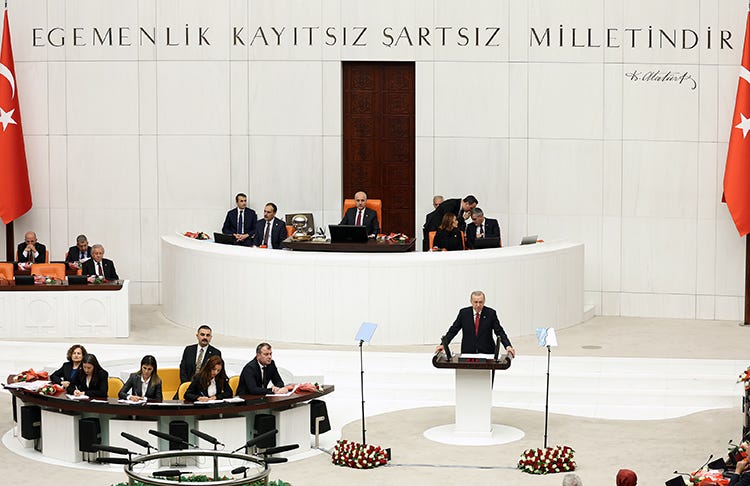
I have a few things to say about this, but let’s first look at what exactly he said. The speech isn’t yet on the presidential website (best place to get direct quotes), so I got it on AA. Erdoğan was supposed to talk about the start of the legislative season here, and he did do a bit of that (especially about his new constitution), but he devoted most of the speech to Israel, calling them a genocidal terror state, and likening Netanyahu to Hitler.
As for the claim that Israel would seek to invade Turkish territory — he actually made it twice:
The Israeli administration acts with the delusion of a ‘promised land,’ entirely with religious fanaticism. After Palestine and Lebanon, the place it will set its sights — I will be frank here — will be our nation’s soil. All the calculations are currently about this. This is what some friends of Israel in Turkey, some Zionist lovers, and voluntary or paid Zionist propaganda apparatuses do not understand.
…
From here, I ask once again to those who have been playing the three monkeys for 360 days: how will you look your children in the eye tomorrow? How will you look into your own eyes in the mirror? If Palestine and Lebanon are not safe, do you really believe that you can be safe? We see that Israeli aggression, with every reckless statement, includes Turkey. For our homeland, for our nation, for our independence, we will continue to stand against this aggression, this state terror with every means at our disposal.
So it’s pretty clear here, especially at the top, that Erdoğan believes Israel to have designs on Turkish soil.
If you came up in the era of liberal internationalism, such statements just seem ridiculous, and must be discarded. The journalist Amberin Zaman did just that, tweeting:
Nobody takes such claims seriously. Turkey is a NATO member and helps supply Israel’s war effort by allowing Azerbaijan to export oil to Israel via Turkish ports meeting almost half of its needs.
I agree.
The analyst Sinan Ülgen, a former diplomat and veteran think tankers, also felt compelled to put out a tweet chain:
Turkey cannot be a target of Israel in the conventional sense. It is not possible. It is not possible in terms of the disparity in power, it is not possible politically, and it is not possible in terms of Israel's current geopolitical difficulties.
He then said that there could be sparks flying in the intelligence and cyber space, but that was it.
Those are both veterans of the Turkey-watching world, and they make perfectly sober, rational points. I agree with them. Of course the Turkish state doesn’t think that Israel will seek to invade and hold Turkish territory. The Turkish military isn’t gearing up for an Israeli invasion. That would be silly.
So why did Erdoğan say this?
Seriously. Why?
Surely the things that Israel is doing are terrible enough on their own. Yes, Hamas’s October 7 attack was awful, but since that day, the IDF has been killing tens of thousands of people in Gaza, most of whom are women and children. As of last week, Israel is making incredibly aggressive moves against the military forces surrounding them, which might just spark a regional war. And yes, Israel is an Apartheid state, and yes, its actions are also heavily laced with religious fanaticism.
As a result, Israel is perhaps the least popular country in the world, and its actions today are supported only by a narrow group of elites in Western countries.
Why not just say all that? Why does Erdoğan feel the need to top it by saying that Anatolian soil is under threat? Is it a slip of the tongue? Or was it perhaps an overly dramatic speechwriter?
Perhaps it’s useful here to take a step back. Let’s ask oursevles this: how do reactionary nationalists use language? While covering Trump in 2016, Salena Zito famously wrote that “the press takes him literally, but not seriously; his supporters take him seriously, but not literally.” Let’s change that up a bit to fit Erdoğan: “Western diplomats, journalists, and analysts take him literally, but not seriously; his supporters take him seriously, but not literally.”
So on this issue, how do we take Erdoğan seriously, but not literally?
First, we look at where he got the idea from. Second, we look at how he’s using it.
“Greater Israel” in Islamist thinking
The idea that Israel wants to expand far beyond its borders has long been in circulation across the Middle East. In these conspiracy theories, “Greater Israel” roughly ranges from the Nile to the Euphrates. People cite various mystical sources to support this, including parts of the Hebrew Bible (Genesis 15: 18-21) and Israel’s flag, which has two blue stripes and the Star of David in between.
Below is a map from 1985 that makes this claim. It’s from an English-language edition of The Protocols of the Elders of Zion, published in Iran in 1985.
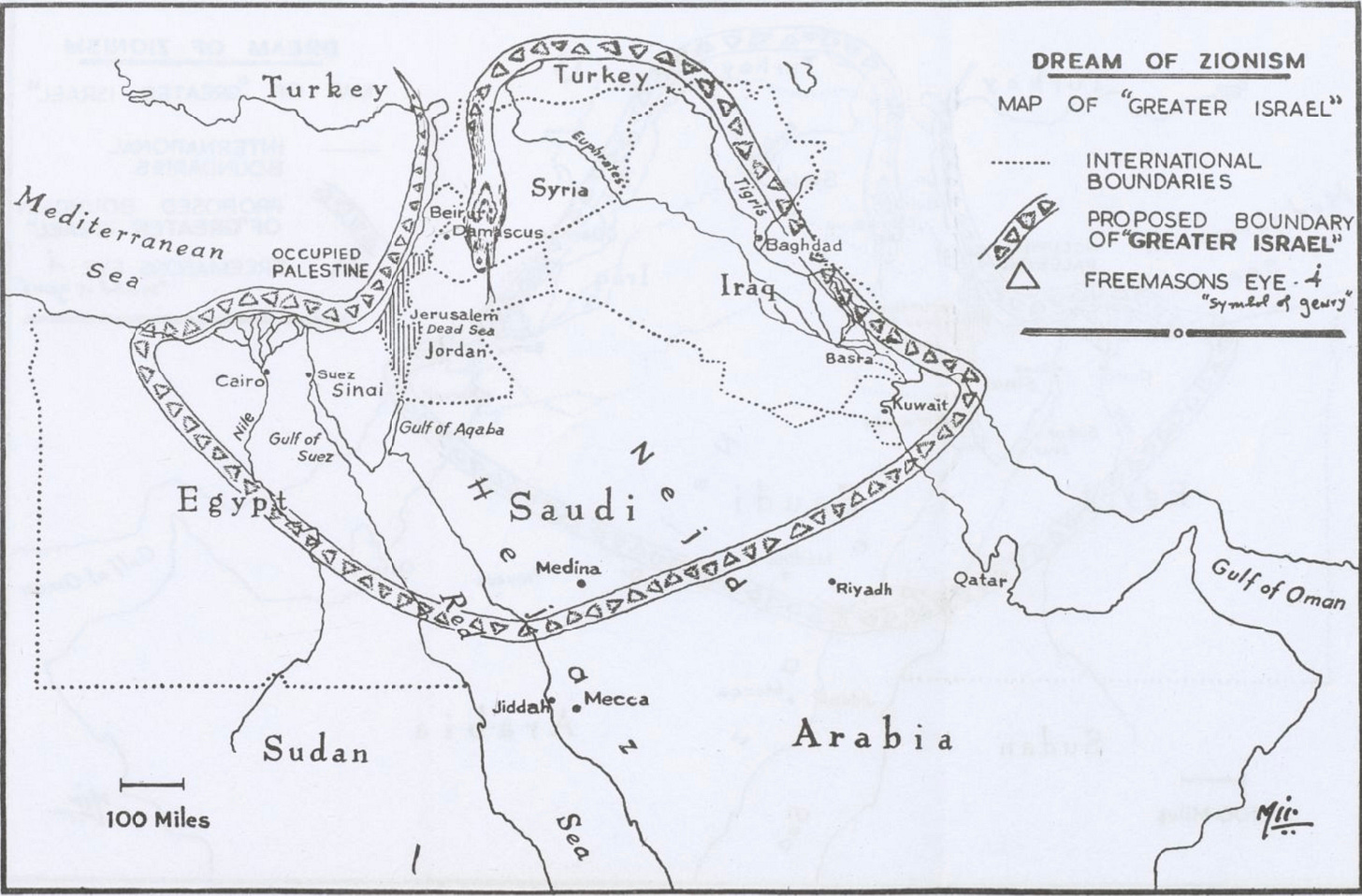
I’m not sure when this idea made its way into Turkey. The person who started European-style anti-Semitism in Turkey was Cevat Rıfat Atilhan, an Ottoman soldier who pursued Jewish spies against the empire. He was a Turanist, then became an Islamist, and was deeply influential in those circles. I wouldn’t be surprised if he put that kind of a twist on Zionism as he was translating The Protocols into Turkish.
Writers like Kadir Mısıroğlu and Necip Fazıl made prominent use of the idea of “Greater Israel.” They argued that Israel was an expansionist power that believed it had a right to the “promised land,” or as they put it in Arabic (because it sounds more authentic), “Arz-ı Mev'ud.” This always included chunks of Anatolia. Necmettin Erbakan, Erdoğan’s political mentor, could talk for hours about this stuff (here’s how he handled the subject in his autobiography).
Israel of course, has plenty of nut jobs of its own who believe in some form of “Greater Israel.” This is not to be confused with the idea of “Eretz Yisrael Ha-Shlema” meaning “the whole of Israel,” the Israeli far-right’s way of incorporating the occupied West Bank and Gaza into Israel proper. There are people even further to the right, settlers and fascist cabinet ministers, who claim that they deserve to have all the land between the Euphrates to the Nile. Islamists take this as validation for the conspiracy theory.
All that is to say that the Turkish internet is full of this stuff lately. Here’s what a bit of random Googling and social media scrolling will get you:
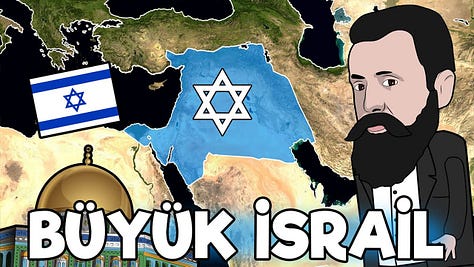
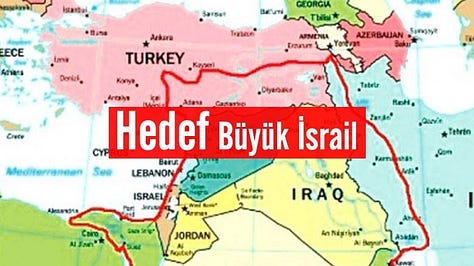
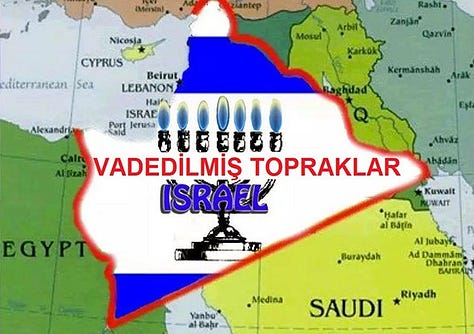
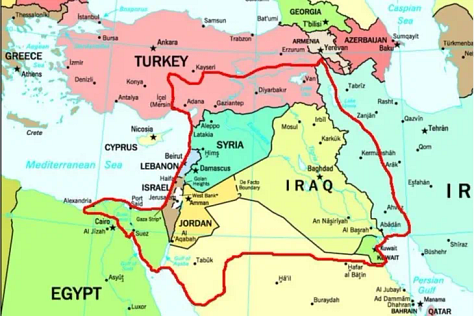
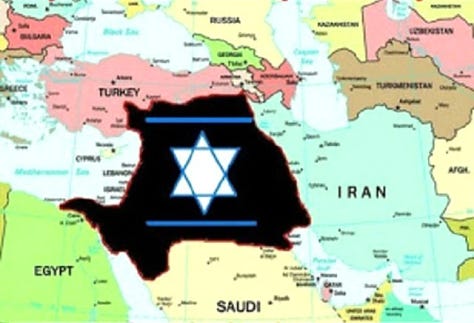
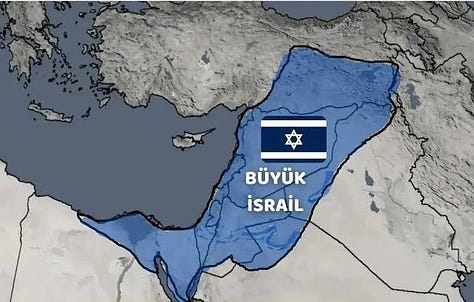
Looking at the irredentist map of “the enemy” can have a head-spinning effect. It’s a little window into his dreams and aspirations, and that’s always a bit of a thrill.
When a Turkish person looks at these, they will notice right away that parts of “Greater Israel” stretch out to Anatolia, eating into the Kurdish-majority parts of Turkey. This immediately invokes the ghost of Kurdish separatism. Will the Kurds cooperate with Israel? With America? Is that what’s been happening all along?
Left-wing Kurds are opposed to Israel’s occupation of Palestinian territory (and used to be linked to the PLO) but secular right-wing Kurds actually sometimes do have a favorable opinion of Israel, sometimes explicitly because they seem them as possible liberators. That makes Islamists all the more uneasy. Sometimes I think that Netanyahu pokes Erdoğan on the Kurdish issue just to make him paranoid.
My favorite theory however, is still Erbakan’s. He thought that Israel would get to this map by a diplomatic slight of hand. Here’s how they’d do it: the global jewish conspiracy would get the EU to accept Turkey and Israel as members, then they’d say that the Union had become too big, and needed to split into Western and Eastern Unions (a-la Roman Empire). Once that happened, Turkey and Israel would have pooled their sovereignty inside a polity, and the Israelis (being the devils they are) would effectively have full control of Turkey.
I know, it’s a very elegant theory. But I digress.
To sum up, “Greater Israel” is a conspiracy theory that’s been around for generations, is heavily present in the Islamist political tradition, and is buttressed by real-life Israeli fascists.
That’s the kind of ideascape that Erdoğan is tapping into.
The utility of enemies
It’s not very difficult to understand why Islamist politicians find the idea of “Greater Israel” idea appealing. The Israel-Palestine conflict is important to people, but it is far away. If you don’t happen to be in Palestine, Lebanon, Jordan, and maybe Egypt, your day-to-day life won’t be impacted by the conflict at all. You might even be at risk of thinking about the economic and political structures that keep you down.
Enemies unite the nation. If Erdoğan simply slammed the Israelis and praised the Palestinians, that’d be fine, but it would feel very remote. When he added the threat of “Greater Israel,” it added some immediacy to the issue. This was now a subject at the core of the country’s agenda, a weighty matter of national security and forward defense.
Crucially, Erdoğan was speaking to parliament, with the opposition also present. This was an opportunity to make a friend-enemy distinction that they could also adopt. After Erdoğan’s speech, Devlet Bahçeli, Erdoğan’s pan-Turkist ally, did something that stunned everyone — he got up and shook hands with the left-Kurdish DEM MPs, telling them that the region was going through a tough time, and that government and opposition should stick together.
Bahçeli almost never does that kind of thing. It was very clear that Bahçeli and Erdoğan had discussed this. They wanted to frame the Israel issue in a way that would make it easier for the opposition to cross the aisle towards them.
And it worked. A couple of days later, CHP chairman Özgür Özel addressed his parliamentary group, saying:
We want to be informed on Turkey’s security issues. If there is a threat on the Israel issue, we want to know. Israel’s power won’t be enough [to pose a threat] for Turkey. We can challenge Netanyahu together, but we won’t allow this problem to overshadow Turkey’s real problems.
If that sounds confusing, it’s because Özel was confused. He said that he wanted Erdoğan’s people to inform him on whether Israel was a threat to Turkey, said that it couldn’t be one even if it was, but that in any case, none of this would prevent the opposition from doing its job of challenging the government.
This was a clear victory for Erdoğan. He uncorked a vintage conspiracy theory, gently handed it to the opposition, and watched as they twisted themselves into a pretzel over it. Brilliant.
Far right leaders, of course, understand how to use this kind of language to break through the noise and realign politics in their favor. They invoke an image that’s crazy, but compelling, the sort of thing that validates people’s worst fears. That’s what Trump did with the birther conspiracy, and more recently with Haitians immigrants eating cats and dogs. That’s also what the Israelis said about baby decapitations on October 7. People create these images spontaneously, and they quickly take lives of their own.
A caveat
I should note that I’m a bit hesitant to bring up anti-Semitic conspiracy theories at this time. After all, it could serve as ammunition for people in Washington and Jerusalem, who think that the entire region has an irrational hatred of Jews anyways, and that talking to Muslims is therefore futile. All they can hope for is to inflict one humiliating defeat after another, until the region finally accepts Zionism as a reality.
As Netanyahu said in his testimony to the US Congress in 2002 discussing “the war on terror,” there were “three Ws of fighting terrorism: winning, winning, winning” and “the more victories you amass, the easier the next victory becomes.” As you build up such a winning stream, Muslim leaders will look for ways “to be OK with America” and shift their behavior.
It must be a very convenient thought. There Israel is, surrounded by people who despise it, and it feels hopeless. But perhaps not. Perhaps there is a way to change people’s minds, and it involves doing things America and Israel are very good at.
I’m no “geopolitical strategist,” but it feels extremely dangerous to me, not least because we have experienced the Afghanistan and Iraq wars for the better part of a generation.
These wars only bring out the worst in our leaders and in our societies.



